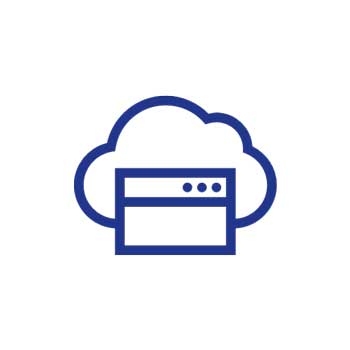When you build a website, you need the dynamic duo of a domain name and web hosting working together to create your online presence. But what’s the difference between the two?
Table of Contents
Batman and Robin. Thelma and Louise. Han Solo and Chewbacca. Patsy and Edina. Bert and Ernie. Sometimes you just need a partner to get great things done.
When you build a website, you need the dynamic duo of a domain name and web hosting working together to create your online presence. But what’s the difference between the two?
What’s a Domain Name?
A Domain Name is your business name and digital address on the web: It is the bit that people type into their browsers to find your website (e.g. www.heartcomms.com.au). Every digital address on the internet is unique. (This post has tips on how to choose the right domain name for your business.)
What is Web Hosting?
Web hosting is your digital house on the web. Hosting is where all the files and code that make your website look and operate the way it does.
How do they work together?
Your domain name is linked to a mega digital address book. When someone types in your domain name into their browser, in a fraction of a second your computer browser races through the ether to look up the record relating to that string of letters to work out what they mean and then find your digital address. This is known as DNS lookup.
Depending on who you have registered your domain name with, the time taken for a domain name lookup can range from 10ms to a few seconds or more. DNS lookup time varies depending on your domain name registrar and how they have set up or configured their name server.
Once the computer browser finds your digital address in the digital address book, it then travels to that address and accesses the files from your hosting account to make your website appear (or render) in the person’s browser.
When the person’s browser lands at your digital address, their computer starts to put all of the files together in the order that your website code tells them.
Websites are complex things and consist of words and images as well as code, links to other websites like Facebook if you have social media links, Google if you have Google Analytics installed, Google Fonts for the type of fonts your website uses and a stack of other places.
I like to think of it as if every time someone comes to your website, the digital pixies have to race around and gather and mix all of the ingredients for an amazing cake based on a mammoth recipe. While most pixies dash around the kitchen, some pixies have to scurry away to far away lands and come back with their ingredient before the cake can be made.
How fast these digital pixies get your cake together depends on a number of factors.
Some pixies live in a disorganised home, which means getting their cake on the table takes longer than it should. In tech terms, this is called Time to First Byte, and a long wait is often a reflection of a poorly set up web hosting server.
Being on poor quality hosting where you are jammed in with a few thousand random strangers can also impact on how fast the pixies can get your site sorted. It makes sense that if your digital pixies have to share facilities with other pixies, that at times they can trip over each other or fight to get to the virtual fridge or stove.
You can speed up the process for your digital pixies by having them prepare some of the ingredients in advance, so the time taken to prepare your site is faster. One way this is done is through caching. We use and recommend WP Rocket as our caching tool.
You can also use a content distribution network (CDN) such as Cloudflare to speed up your content delivery around the net.
If your DNS lookup is slow, you can look at add-one paid services to speed up your DNS lookup such as Cloudflare or DNS Made Easy.
With the internet, speed matters. So, every millisecond that is added to the load time of your site is an issue. (Here are some simple ways to speed up your website).

How do you register a domain name?
In Australia, the main domain name administrator is auDA. The auDA maintains the registry of all domain names that end with .au. Other countries have different registries, each with slightly different rules and regulations.
When you to register a domain name, you need to use a domain name registrar. In Australia, domain name registrars are companies authorised by auDA to help people register, update or renew their existing .au domain names. They are the go-between between auDA and you.
It is important to use a domain name registrar that is reputable and responsive to questions (because you WILL have them!) Some of the more reputable companies that deliver relatively fast DNS lookup are Google Domains (they don’t offer .com.au domains) and Namecheap.
If you want to test how good your DNS server is, then run it through Zonemaster to find any problems.
Things to think about when registering a domain name
Go to one of the reputable sites and check if the domain name is:
- Available
- Short and easy to spell
- Without hyphens or dashes (otherwise you will spend your life saying “hyphen” and watching your clients not enter one and head off into the never-never and possible malware sites).
- Without creative spelling – substituting numbers for letters works on license plates, but not so much for domain names. You confuse the heck out of your clients as they make mistakes typing it in.
When registering your domain, the simple rule of thumb is if your clients are mainly in Australia, then go for a .com.au. If they are mainly in the US, then go for a .com. It used to be that .com was good for everything – those days are long gone, so go for a domain where your clients are located.
Whatever domain name registrar you choose, make sure you can log in and access your domain name. Don’t EVER lose control of your domain name by having your web designer or host register it for you and not give you access. It is like you giving them the deeds to your home.

How do you organise web hosting?
There are more web hosts than Tupperware and multi-level marketing people. What most businesses don’t tell you is that they are resellers and take a commission for sending your business to one of the larger companies.
We used only to recommend boutique web hosting, where there were no resellers and servers were located in Australia and we could meet face-to-face with tech support if needed. However, we have found that many of the smaller companies do not keep pace with security and other tech changes, leaving our clients vulnerable. They also could not provide the level of support that our clients needed and demanded.
That’s why we currently recommend VentraIP or WP Engine where servers located in Australia are important, and Kinsta or Flywheel if you are overseas.
So far, these suppliers are large enough to get the tech side of things right, as well as having fantastic customer support.
Things to think about when choosing a web hosting package for your website
Cheap is not always the best way to go. You can get hosting from about $5 a month, but you may find your site is constantly down or you get extra bills for going over your usage caps (a bit like a mobile phone).
Consider:
- Does your website include e-commerce or membership functionality? You will need a higher level of hosting to cope with the demands. You also need to move to more secure hosting to protect your transactions and clients.
- Do you use your hosting also to store/run your emails or do you use GSuite/Office365? You may need a larger space if you use your hosting to store/run your emails.
- How many people per month visit your website? High traffic sites need better quality hosting.
- Do you need help migrating from another host? Good hosts will migrate your website/emails for you for free or a nominal cost.
- Do you need a testing site to test plugins/themes before updating them on your live website (cough … yes!)
- Do they make it easy to move if you are unhappy?
- Does your webhosting use cPanel, Plesk or something else to help you manage your hosting?
I have experienced too many horror situations with web hosts pulling sites down the second the client says they want to leave, without giving them access to the files or ensuring the client has backups. When challenged, the host says, “I asked them, and they said yes”, but when pushed you find they baffled the client with geek speak, or didn’t explain the implications of the actions, so the client had no idea what they agreed to.
I am now at the point of telling most clients to move by stealth – making sure that everything has moved and is fully functional over on the new host before telling the old host, just to stop this problem from occurring.
Can you use the same company to register your domain name and host your website?
There are pluses and minuses of having your domain name registered through the same company as your website hosting.
The biggest plus is you only have one tech company to deal with, and they are more invested in getting your domain name registration to work well with your hosting.
However, we have also had some horrible experiences with boutique hosting providers and misconfigured servers that slowed our sites to a crawl, which negated any productivity benefits we had gained.
We have also experienced hosts holding domain name registration hostage or insisting on making all domain name changes themselves (and making mistakes) which meant sites did not load correctly.
Also, if things go pear-shaped with your hosting company, by having both your domain name registration and hosting with them, it can be much harder to escape their clutches, and they can drag their heels to release your domain name to a new registrar.
In other words, having both with the same company works brilliantly when things are going swimmingly, and you can trust them to do the right thing. It is when there is a problem that you realise the benefits of separating your tech eggs into different baskets.

How do you point your domain name to your hosting?
Once you have registered your domain name, you need to tell your domain name where your website is hosted.
Your web host will give you some numbers to add to your DNS records in your domain name registration so that computers know where to find the files for your website. If you aren’t sure where to put the numbers, a good domain name registrar or host will help guide you.
Can you move your hosting while keeping the same domain name?
Your hosting is just a bunch of files, so they are easy to pick up and move to a new host (assuming your current host has configured their servers correctly).
You can leave your domain name registration with your domain name registrar and simply point the DNS records to your new host at any time. You don’t have to move your registration or lose your domain name to move web hosting.
Why isn’t it instant when you point your domain name registration to your new host?
When you have a new website built on new hosting, and then add in those magic new addresses to your domain name registration, you would think that the changes are instantaneous.
However, the reality is that it can take up to 48 hours for all the domain name authorities and registrars to change their records to your new hosting. This is called propagation, and during that time, your website can flick between the old and the new depending on who is looking at your site, and where they are looking at it from.
If we go back to our digital pixies, some of them get lost or have old addresses, and it takes them a while to consistently go to the new address.
To watch your site trickle out throughout the world, you can check using a DNS Propagation Checker tool. (Choose NS from the dropdown box to see when the different registrars change to your new domain server).
Last thoughts
Every website has two critical tech pieces to them. The domain name and web hosting. The decisions you make on these two pieces can profoundly affect the speed, security and stability of your website.
If your business relies on your website, then don’t skint on investing in quality domain name registration and web hosting, and don’t be afraid to move to get the level of service your business deserves.





